- Home
- Terry C. Johnston
Death Rattle tb-8 Page 2
Death Rattle tb-8 Read online
Page 2
Twenty-four of them pitted against half a thousand Sioux and Cheyenne. Not to mention a hundred or more Arapaho who had showed up not long after the whole shebang got kicked off with that first noisy, hoof-rattling charge. Damned Arapaho must have been camped somewhere close and come running with all the hurraw and the gunfire.
Titus grinned humorlessly and pushed aside the one narrow braid that hung at his temple. The rest of his long, graying hair spilled over his shoulders like a curly shawl. All of it tied down with a faded black silk bandanna that also held a scrap of Indian hair over that round patch of naked skull left him so long ago. He thought on that bunch of Arapaho who had caught him alone many, many summers before—and stole his hair. Remembering how he eventually ran across the bastard who had taken his topknot … how he had lifted this small circle of hair from the crown of the scalper’s head. Recalling how glorious it had been to take his revenge.
So Titus grinned: maybeso some of the bastard’s relatives were in that bunch watching the Sioux and Cheyenne have at the white man’s corral. Wouldn’t be long now before those Arapaho would figure it was time to grab some fun of their own.
Glancing at the sky, Bass found the blazing sun over his shoulder. Long as they’d been fighting already, and it wasn’t yet midmorning. That meant they were staring at a double handful of dead-slow hours behind these packs and stinking carcasses. And with the way the first of the women were starting to bristle along the crest of that hilltop yonder, the warriors weren’t about to ride off anytime soon, not with the whole village showing up to chant and sing their men on to victory, on to daring feats of bravery, on to suicidal charges that would leave the bodies of one warrior after another sprawled in the grass and dust of that no-man’s-land all around the trappers’ corral. Bodies fallen too close to the rotting breastworks for other riders to dare reclaim.
Titus blinked and wiped the sweat out of his eyes with the sleeve of his faded, grease-stained calico shirt. And saw the flecks of blood already dried among the pattern of tiny flowers. The mule’s blood. Bass glanced quickly at the sun once more, wondering if this was the last he would ever lay eyes on.
Would he ever see the coming sunset as he had promised himself summers and summers ago when he managed to ride away from that scalping, a half-dead shell of a man clinging to Hannah’s back? Would he ever see another black mountain night with its brilliant dusting of stars as he lay by the fire, staring up at the endlessness of it all, Waits-by-the-Water’s head nestled into his shoulder just after they had coupled flesh to flesh? Would he ever again see their children when they awoke each morning, clambering out of their blankets and tottering toward him as he fed the fire and started the coffee—eager to fling their little brown arms around his neck, squeezing him with what he always took as their utter joy in having another day to share together.
Together.
Oh, he wished he was with the three of them now.
How thankful he was that he had compelled Waits to remain behind with the little ones. If the three of them were here among these twenty-four ill-fated men now …
With the breakup of that last pitiful rendezvous shared by a few holdouts in the valley of the Green River, Bass had watched old friends disperse on the winds. Some gave up on the mountains and pointed their noses back east to what they had been. Others like Meek and Newell set a new course for Oregon country where the land was fertile and free.
But a hardy few had determined they would hang on, clinging to the last vestige of what had been their finest days. What had been their glory.
Never again would the big companies dispatch their trapping brigades into the high country. There was no money to be made in trading supplies for beaver pelts at a summer rendezvous on the Wind, the Popo Agie, or some fork of the legendary Green. Bridger and Fraeb formed a new partnership and brought out that last, undersized pack train from St. Louis in ’40. Afterward, while Bridger led a small band of trappers north, Fraeb and Joe Walker started for California with a few men of their own.
Bass marched his family north with Gabe’s undermanned bunch. And when Bridger turned off for Black-foot country, Titus had steered east for Absaroka and the home of the Crow, his wife’s people. There would always be beaver in that country—even if he had to climb higher, plunge deeper into the shadowy recesses than he had ever gone before. And, besides—traders like Tullock were handy enough with his post over at the mouth of the Tongue. He’d continue to trap close to the home of his wife’s folk; trade when he needed resupply; and wait for beaver to rise.
The way beaver had before. The way it would again.
They had a fair enough winter that year—cold as the maw of hell for sure, but that only meant what beaver he brought to bait were furred up, seal-fat, and sleek. When the hardest of the weather broke, he took a small pack of his furs down to Fort Van Buren on the Yellowstone, only to find that Tullock couldn’t offer him much at all in trade. So Titus bought what powder and lead he needed, an array of new hair ribbons for his woman, a pewter turtle for Magpie to suspend around her neck, and a tiny penny whistle for Flea.
How Bass marveled at the way that boy of his grew every time he returned to the village from his trapline or a trading venture. At least an inch or more every week Titus rode off to the hills. Even more so when he returned from a long journey to the Tongue. Flea was four winters old now, his beautiful sister to turn seven next spring, looking more and more like her mother with every season.
Where it used to break his heart at how Waits-by-the-Water first hid her pox-ravaged face,* it now gave him comfort that she had made peace with what the terrible disease had cost her: not only the marred and pocked flesh but the loss of her brother. Every time Bass returned from the hills, come back from the wilderness to the bosom of his family, he quietly thanked the Grandfather for sparing this woman, the mother of his children, from the cursed disease that had decimated the northern mountains. And, he never neglected to thank the All-Maker for the days the two of them had yet to share.
With the arrival of spring following that last rendezvous, he decided to mosey south, taking a little time to trap if the country looked good—but intending above all else to be in the country of the upper Green come midsummer when Bridger planned to reunite with Fraeb. On the Green last year before going their separate ways, there had been serious talk of erecting a post of their own.
Damn, if that news didn’t stir up a nest of hornets among the old holdouts! Hivernants the likes of Gabe and Frapp ready to give up on trapping beaver? The two of ’em turning trader?
Such black notions he had done his best to push out of his thoughts over that winter. No sense in his tying his mind in knots around something that was nothing more than talk. Why, Frapp and Gabe had been out in these here mountains pretty near from the beginning. If anyone else but himself knew beaver was bound to rise again—it was them two! But … when Gabe or Frapp gave up trapping and settled down to trade fixin’s for furs, why—it meant nothing less than the old days was over for certain.
By the time Bass reached Black’s Fork of the Green, he was nonetheless startled to discover that Bridger and his men had started laying down cottonwood logs, chinking them with clay from the riverbank. They had the walls and some of the roof done six weeks later when Fraeb and his outfit rode in from their exploratory expedition to California, not one of their pack animals swaybacked under furs. Not much of anything to show for all those months and miles. Out west to the land of the Mexicans Fraeb’s outfit sold off all their beaver for some beans, soap, tobacco, coffee, and sugar, along with seventeen mules and a hundred mares. Not to mention trading for the head-hammering aquardiente those Mexicans brewed out there beyond the mountains.
After a little celebrating at their reunion, wetted down with some whiskey Bridger traded off a small train of emigrants bound for Oregon who had tarried at Gabe’s half-completed post long enough to recuperate their stock, Fraeb proposed a short journey south by east where the men might trap and make meat. Bridg
er stayed behind with a handful to continue work on their post before winter slammed its fist down on the valley of the Green.
Bass chose trapping and hunting over the mindless chores of a cabin-raising sodbuster. He figured he’d pounded enough nails and shingled enough roofs back east to last him the rest of his days.* So when Henry Fraeb’s twenty-two rode out for the Little Snake, Titus went along. He reckoned on sniffing around some country he hadn’t seen much of since he lost hair to the Arapaho. Might just be a man could find a few beaver curious enough to come to bait.
Besides … among the old German’s outfit were some of the finest veterans still clinging to the old life in the mountains. Yessirree! This hunt that would take them into the coming fall might well be the last great hurraw for them all.
Those long days of late summer seeped slowly past. None of them ran across much beaver sign to speak of, and where the men did tarry long enough to lay their traps, they didn’t have much success. Not like the old days when a man could damn well club the flat-tails, they were thick as porky quills! The hunting wasn’t all that fair either. Game was pushed high into the hills. Bass and others figured the critters had been chivvied by the migrations of the Ute and Shoshone.
Turned out the game was driven off by the hunting forays of this huge village of wandering Sioux and Cheyenne, not to mention that band of tagalong Arapaho.
The sun had been up a good three hours that morning when one of Fraeb’s outriders spotted a half dozen horsemen on the crest of the hill across the Little Snake.
“If’n they was Yuta, them riders be running down here first whack,” Jake Corn snorted. His black beard extended right on down his neck and into his chest hair in one continuous mat. “Begging for tobaccy or red paint.”
“Snakes too,” Rube Purcell added. His greasy, matted, deerhide-brown hair was already flecked with snows of age. “Poor diggers them Snakes be.”
“Those ain’t either of ’em,” Elias Kersey growled. “An’ that’s a yank on the devil’s short-hairs!”
“Lookit ’em,” Bass remarked. “Just watching us, easy as you please. Ain’t friendly-like to stare so—is it, Frapp?”
The old German hawked up the last of the night-gather in his throat and spat. “Trouble is vhat dem niggurs lookin’ at.”
Fraeb picked four men to cross the river ahead of the rest, making for the far slope and those unfriendly horsemen. Stop a ways off and make some sign. See how the winds blew and the stick floats. Then the rest started their animals into the shallow river just up the Little Snake from the mouth of a narrow creek. The trappers had the last of the pack animals and spare horses across right about the time the first muffled gunshot reached them.
Every man jack jerked up in surprise, finding their four companions wheeling round and returning lickety-split, like Ol’ Beelzebub himself was right on their tails, one of their number clinging the best he could to his horse’s withers as they lumbered down the long slope. Behind them came the six strangers. And just behind that half dozen … it seemed the whole damned hillside suddenly sprouted redskins.
“Fort up! Fort up!” came the cry from nearly every throat as the four trappers sprinted their way.
Fraeb’s twenty spun about, studying things this way, then that—when most decided they would have to make a stand of it right there with the river at their back.
“Pull off them packs for cover!” one of them bellowed.
But Bass knew right off there weren’t enough packs to make barricades for them all. Not near enough supplies lashed to those pack saddles to hide behind, and sure as hell not any beaver bundles to speak of. One last-ditch thing to do.
“Put the horses down!” One of the bold ones gave voice to their predicament.
“Shoot the goddamned horses!” another voice trumpeted as the four scouts reined up in a swirl of dust and hit the ground running, reins in their hands.
That’s when Titus could make out the yips and yells, the taunts and the cries—all those hundreds of voices rising above the dull booming thunder of thousands of hooves.
A tall redheaded youngster next to him came out of the saddle and was nearly jerked off his feet when his frightened mount reared. From the look on the man’s pasty face Bass could tell this might well be the most brownskins the youngster had ever seen.
“Snub ’im up quick and shoot him!” Bass grumbled as he lunged over to help the redhead.
“Pistol?”
“Goddamned right.” Then Titus turned his back and double-looped his own mule’s lead rope around his left hand as he dragged the .54-caliber flinter from his belt with his right.
“Drob de goddamned hurses. Ebbery one!” Fraeb repeatedly roared as the first few animals started falling.
From the corner of his eye, Bass watched the redhead obey. As the mount’s legs went out from under it, the horse nearly toppled the trapper. But redhead scrambled backward in time, spilling in a heap atop Titus’s thrashing horse.
“You got a pack animal?” Bass demanded.
The redhead lunged onto his feet, craning his neck this way, and that, then shrugged. “Not no more.”
“Get down and make ready to use that rifle of your’n,” Titus ordered, then turned to bid farewell to the mule just a breath or two before the screeching horsemen dared to break across the flat into range of their powerful, far-reaching weapons.
He laid a hand on the mare’s neck as she breathed her last, stroking the hide until she no longer quivered. Gazing out over the slopes where the warriors gathered just beneath the ranks of their women, children, and old men … when he saw her.
Clearly a woman. Dressed in the short fringed skirt that exposed her bare copper legs draped on either side of her brown-spotted pony. A short, sleeveless, fringed top hung from her shoulders where her unbound hair tossed on every hot gust of wind. Make no mistake: that was a woman. While the warriors were stripped to their breech-clouts and moccasins, wearing medicine ornaments and power-inducing headdresses, the one intently watching the action from the hillside was clearly a woman—and probably a powerful one to boot.
Around her stood more than a double handful of attendants, young women and boys, all on foot. Together they joined in her high-pitched chants. She must be imploring the warriors to fight even harder, dare even more with each renewed assault.
“You see dat she-bitch?” the gruff voice asked in a masked whisper.
Bass turned to see Fraeb settling in beside him, joining him between the horse’s fore and hind legs.
“Who she be, Frapp?”
The old German stared at the hillside, reflecting for a moment before answering. “She der princess.”
“Princess?”
“Ya. Der princess dey fight for.”
Titus couldn’t quite believe how preposterous it sounded. “A woman’s giving the orders to all them bucks?”
Elias Kersey nodded. “That bitch makes medicine for them bucks to rub us out.”
Now Titus had to grudgingly agree, as an idea dawned on him. “Yeah, medicine. I’ll bet if one of us knocked that damn princess down—them brownskins see their own medicine shrivel up like salt on your ol’ pecker, Frapp.”
“She come close your side, Titass—you knock her down, ya?” Fraeb asked as he rocked back onto his hands and knees to crawl off.
Licking his dirty thumb and brushing it over the front blade at the end of his rifle barrel, Bass vowed, “See if I can do just that.”
Back over at the far end of the oval after the horsemen made their twelfth deafening rush on the corral, Henry Fraeb once more was squealing out orders, ordering more of the men to hold off firing—thereby making sure they would have at least half the guns loaded at all times. No more than a dozen were to fire at once, he noisily reminded them again and again after every smoky volley. No less than a dozen must be ready should the whole hillside erupt in an avalanche of hooves and bows, flooding in a great rush for the white man’s corral.
But charge after charge, the five hund
red never thundered down the long slope and across the river bottom at once, never dared press close to that maze of deadfall and tree stumps, rushing en masse against that corral of buffalo robes, blankets, and bloating carcasses. As the morning wore on, the ground in front of the dead, stinking horses and mules reminded Bass of an autumn field of barren, windblown cornstalks. Almost as many arrow shafts bristled from those huge animals the mountain men had sacrificed to make this last stand.
Well before the sun climbed to mid-sky, two of the trappers lay dead, and the rest were grumbling with thirst. The river lay all too seductively close at their backs. Its faint, late-summer gurgle almost loud enough to hear—were it not for the grunts of the sweating men as they reloaded their rifles, or hurriedly refilled their powder horns from the small kegs pulled from among the scattered baggage. A peaceful, bucolic gurgle as the creek trickled over its gravel bed, to be sure … were it not for the rising swell of war cries and the soul-puckering power of the coming thunder of those hooves.
“Dey comin’ again!” Fraeb would announce what every last one of the twenty-one others could see with their own eyes while the summer sun beat down on that corral of rotting horseflesh and desperate, cornered men.
“Remember,” Bass turned to whisper at the redhead nearby. “Wait till you got a target.”
“What’s it matter?”
He turned and looked at the youngster’s face. “It’ll matter. Each of us gotta take one of the bastards out with every run they make at us … it’ll soon enough matter to them.”
Titus watched the redhead swallow hard and turn away without comment to stare at the oncoming horsemen. Sweat droplets stung Bass’s eyes. Grinding the sleeve of his calico shirt across his forehead, he calmly announced, “They call me Scratch.”
“Scratch?” the redhead repeated. “No shit. I heard of you.” His eyes went to the black bandanna covering Bass’s head. “Word has it you lost hair.”
Grinning, Bass nestled his cheek along the stock of his rifle, squinting at the front rank of horsemen. “That was a long time ago, friend.”

 Black Sun, The Battle of Summit Springs, 1869
Black Sun, The Battle of Summit Springs, 1869 Lay the Mountains Low
Lay the Mountains Low Black Sun: The Battle of Summit Springs, 1869 (The Plainsmen Series)
Black Sun: The Battle of Summit Springs, 1869 (The Plainsmen Series)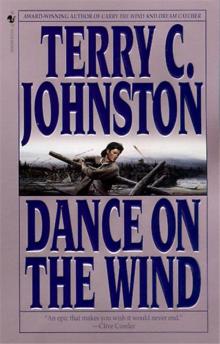 Dance on the Wind tb-1
Dance on the Wind tb-1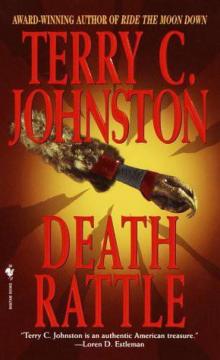 Death Rattle tb-8
Death Rattle tb-8 The Stalkers
The Stalkers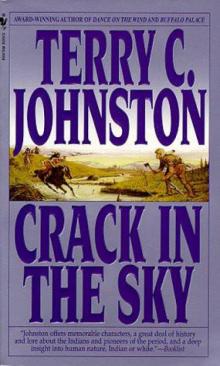 Crack in the Sky tb-3
Crack in the Sky tb-3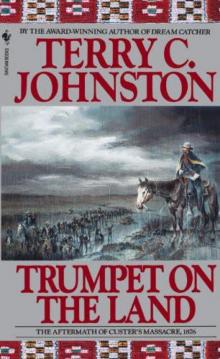 Trumpet on the Land: The Aftermath of Custer's Massacre, 1876 tp-10
Trumpet on the Land: The Aftermath of Custer's Massacre, 1876 tp-10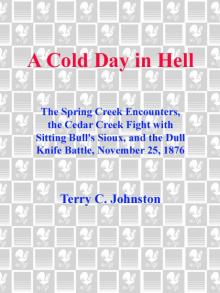 A Cold Day in Hell
A Cold Day in Hell Long Winter Gone: Son of the Plains - Volume 1
Long Winter Gone: Son of the Plains - Volume 1 Buffalo Palace
Buffalo Palace Cries from the Earth
Cries from the Earth Death Rattle
Death Rattle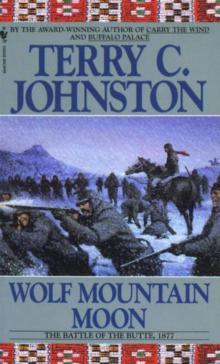 Wolf Mountain Moon: The Battle of the Butte, 1877 tp-12
Wolf Mountain Moon: The Battle of the Butte, 1877 tp-12 Crack in the Sky
Crack in the Sky Wolf Mountain Moon
Wolf Mountain Moon Turn the Stars Upside Down: The Last Days and Tragic Death of Crazy Horse
Turn the Stars Upside Down: The Last Days and Tragic Death of Crazy Horse Winter Rain
Winter Rain Shadow Riders: The Southern Plains Uprising, 1873 (The Plainsmen Series)
Shadow Riders: The Southern Plains Uprising, 1873 (The Plainsmen Series)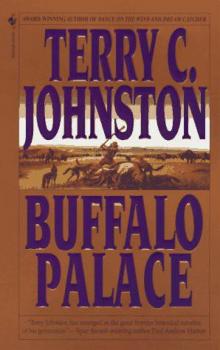 Buffalo Palace tb-2
Buffalo Palace tb-2 Cries from the Earth: The Outbreak Of the Nez Perce War and the Battle of White Bird Canyon June 17, 1877 (The Plainsmen Series)
Cries from the Earth: The Outbreak Of the Nez Perce War and the Battle of White Bird Canyon June 17, 1877 (The Plainsmen Series) Shadow Riders, The Southern Plains Uprising, 1873
Shadow Riders, The Southern Plains Uprising, 1873 Ashes of Heaven (The Plainsmen Series)
Ashes of Heaven (The Plainsmen Series) Ashes of Heaven
Ashes of Heaven Devil's Backbone: The Modoc War, 1872-3
Devil's Backbone: The Modoc War, 1872-3 Wind Walker tb-9
Wind Walker tb-9 Trumpet on the Land
Trumpet on the Land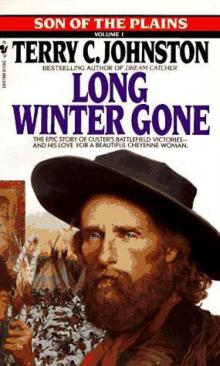 Long Winter Gone sotp-1
Long Winter Gone sotp-1 Dying Thunder
Dying Thunder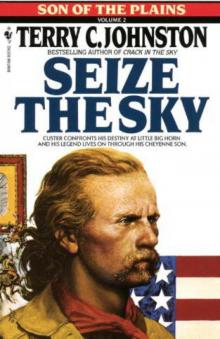 Seize the Sky sotp-2
Seize the Sky sotp-2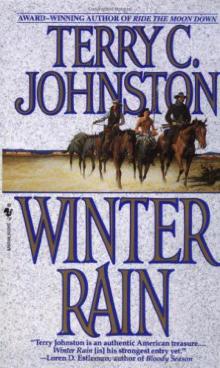 Winter Rain jh-2
Winter Rain jh-2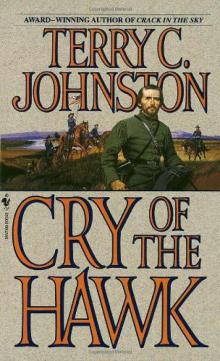 Cry of the Hawk jh-1
Cry of the Hawk jh-1 Sioux Dawn, The Fetterman Massacre, 1866
Sioux Dawn, The Fetterman Massacre, 1866 Sioux Dawn: The Fetterman Massacre, 1866 (The Plainsmen Series)
Sioux Dawn: The Fetterman Massacre, 1866 (The Plainsmen Series) Ride the Moon Down
Ride the Moon Down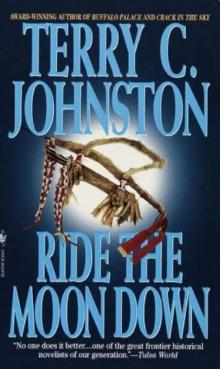 Ride the Moon Down tb-7
Ride the Moon Down tb-7 Red Cloud's Revenge
Red Cloud's Revenge Wind Walker
Wind Walker